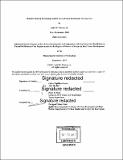| dc.contributor.advisor | Peter D. Roth. | en_US |
| dc.contributor.author | Thorne, Ladd M.,Jr. | en_US |
| dc.contributor.other | Massachusetts Institute of Technology. Center for Real Estate. Program in Real Estate Development. | en_US |
| dc.date.accessioned | 2018-02-08T16:25:18Z | |
| dc.date.available | 2018-02-08T16:25:18Z | |
| dc.date.copyright | 2017 | en_US |
| dc.date.issued | 2017 | en_US |
| dc.identifier.uri | http://hdl.handle.net/1721.1/113469 | en_US |
| dc.description | Thesis: S.M. in Real Estate Development, Massachusetts Institute of Technology, Program in Real Estate Development in conjunction with the Center for Real Estate, 2017 | en_US |
| dc.description | Cataloged from PDF version of thesis. | en_US |
| dc.description | Includes bibliographical references (pages 169-172). | en_US |
| dc.description.abstract | In this thesis, we will examine robotic parking systems. This form of parking infrastructure has the capacity to park the same number of vehicles as a traditional garage in half the space. As the global population increases and waves of people continue to choose urban dwelling, it will be essential to choose the most efficient, environmentally sound, and socially responsible forms of infrastructure. In all three of these aspects, the robotic parking garage is superior to the ramp parking garage. Main topics include: i) the history of mechanized parking systems; ii) specifications for various modem-day ramp and mechanized solutions; iii) current worldwide and domestic factors of demand; iv) a personally researched and written case study; and v) a decision-tree tool that assists developers to hone in on a narrow selection of automated systems for accessory parking. The decision-tree responds to a combination factors, namely, vehicle throughput, site characteristics, and designated primary use. Above all, this thesis will seek to answer the following question: With so much riding on the successful operation of a project's accessory parking, when, if ever, is it in a real estate investor's best professional interest to risk relying on an alternative parking typology? | en_US |
| dc.description.statementofresponsibility | by Ladd M. Thorne, Jr. | en_US |
| dc.format.extent | 172 p. | en_US |
| dc.language.iso | eng | en_US |
| dc.publisher | Massachusetts Institute of Technology | en_US |
| dc.rights | MIT theses are protected by copyright. They may be viewed, downloaded, or printed from this source but further reproduction or distribution in any format is prohibited without written permission. | en_US |
| dc.rights.uri | http://dspace.mit.edu/handle/1721.1/7582 | en_US |
| dc.subject | Center for Real Estate. Program in Real Estate Development. | en_US |
| dc.title | Robotic parking technology and its use in urban real estate development | en_US |
| dc.type | Thesis | en_US |
| dc.description.degree | S.M. in Real Estate Development | en_US |
| dc.contributor.department | Massachusetts Institute of Technology. Center for Real Estate. Program in Real Estate Development | en_US |
| dc.contributor.department | Massachusetts Institute of Technology. Center for Real Estate | |
| dc.identifier.oclc | 1019901921 | en_US |
| dc.description.collection | S.M.inRealEstateDevelopment Massachusetts Institute of Technology, Program in Real Estate Development in conjunction with the Center for Real Estate | en_US |
| dspace.imported | 2019-09-16T18:44:19Z | en_US |
